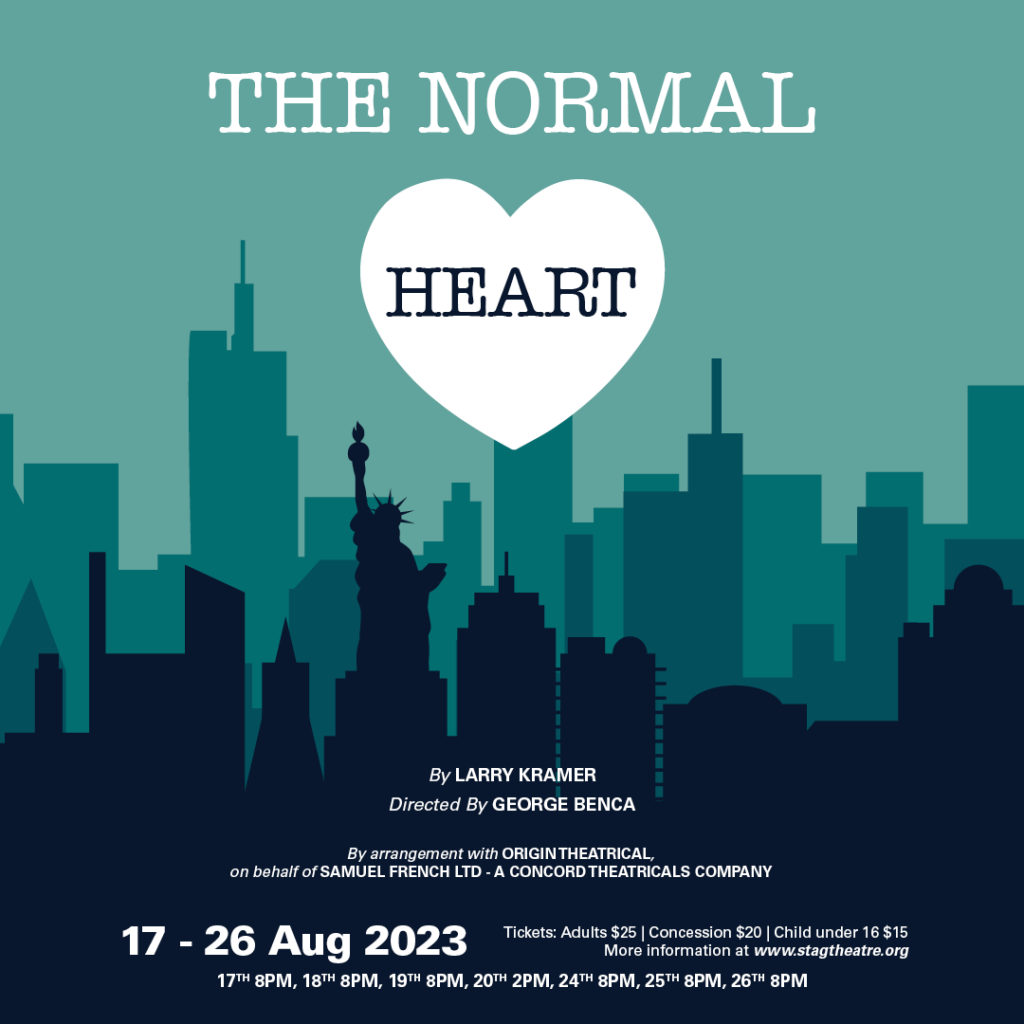Strathmore Community Hall
Until 26 August
Last Saturday night I was back in Strathmore to attend the latest production from STAG (Strathmore Theatrical Arts Group), an adaptation of Larry Kramer’s acclaimed semi-autobiographical play The Normal Heart. The HIV/AIDS epidemic that sweeped around the globe in the 1980s and 90s was one of the most devastating of all time and when it first came on the rise, it instilled fear into the public through its at the time, high death rate and easy transmission through sex, drug use and even blood transfusions. In the early 1980s when the virus was on the rise, knowledge and awareness of this crippling illness was not well known and many people who were living with HIV/AIDS or wanted to spread awareness for it, were heavily scrutinised but none more so than the LGBTQ community. The Normal Heart focuses on the stories of those who bravely battled the disease in those early years and it has resonated with people in the community and theatre patrons worldwide since the play’s debut in 1985. Serious subject matter like this must be portrayed in the most respectful of lights on the stage and must move the audience to a profound extent to remove the stigma placed upon those still fighting HIV/AIDS today and help us understand that they’re still human beings equal to the rest of the world and I believe STAG achieved this feat in the most beautiful of ways with a side of courage and camaraderie.
As a proud member of the LGBTQ and disabled communities, many of the production’s themes and character’s beliefs are ones that I personally hold close to my heart and to see our history represented and played out before us in the most beautiful and bittersweet of fashions resulted in one of the most moving experiences of my life. I’ve been a part of the theatre community for ten years now and as biased as it may sound, The Normal Heart was without a doubt one of the best presentations I’ve seen and it was the first time a show reduced me to tears since I visited Broadway in 2017 and STAG’s adaptation couldn’t have been possible without the strong creative vision of its director, George Benca. Despite not being a member of the queer community, he quickly proved that he was still perfectly capable of directing Larry Kramer’s masterpiece, taking inspiration from his experiences with many LGBTQ performers a part of our community in the 1980s, the long lasting friendships he made with them and the toll the rise of HIV/AIDS took on them all whether or not they were infected. Throughout the evening, Benca’s direction portrayed an accurate take of the feelings and thoughts going through the heads of those affected by the disease from homosexuals to heterosexuals, patients to doctors and activists to government figures in New York City in a battle between fear and ignorance and strength and action on both sides of the political divide. Benca constantly ensured that the emotions pouring out of his actors were genuinely authentic and could connect with the audience on the deepest of levels for them to unleash the greatest of their performance skills in a prestigious and paramount directorial effort that could stay with you long after the final curtain falls and raise awareness of the play’s overall message for all time.
In a cast of only nine people whose work on The Normal Heart could inspire many generations of performers and easily garner them the highest critical acclaim of their respective journies, it was hard to pin point who would be considered the monarchs of the night as they all deserve awards and royal titles for their infinity level performances and dedication to their craft. I start my cast analysis with Blake Stringer and his portrayal of Felix Turner, a New York Times journalist who wins our protagonist’s heart, becomes the love of their life and does everything in his power to ensure their security, their familial relationships and their passion to speak the truth before the disease that cripples him ultimately claims his life. I believe that Stringer was a champion in his own right during the performance as we the audience watched his white knight character convincingly get physically sicker and sicker from the virus but emotionally stronger and stronger for his own and his partner’s sake, resulting in a heroic and heartwarming performance with electric chemistry between himself and his love interest to boot. Next, for his portrayal of Ben Weeks, a lawyer who’s relationship with his brother becomes strained when he fears risking his reputation in the legal field to help his brother’s cause but who’s unconditional love remains and leads to a sad yet sweet reunion, Brian Edmond created a strong bond with his onstage sibling and the crowd as a whole so convincingly, you would think they were family for real and that he proudly had similar experiences in his own life. Edmond’s tremendous and truthful performance was the epitome of respect and acceptance whenever he appeared on the stage and despite his character’s fear of rocking the boat in the corporate world, he acted as a real support for real love, which is something bigger in itself and if that’s not a true hero than I don’t know what is.
Only two of the nine actors really played more than one character in The Normal Heart’s run time and they were Ben Cook and Nathan Williams, both of whom played a mix of supporters and opponents in the fight against the virus. Cook was first introduced as Craig Donner, a terrified, recently diagnosed AIDS patient who goes downhill very quickly and this portrayal alone left quite the impression on me regardless of Criag’s less than ten minutes of stage time with his possession of great talents that could chill you to the bone. Later on, Cook would appear again as mayor’s assistant Hiram Keebler, who had a hand in turning a blind eye to the virus and as Grady, a camp phone operator in the formed Crisis Centre: these portrayals were a testament to what a phenomenally versatile actor Cook really is and his efforts stood out grandly even though he would not be considered as one of the major players. As for Williams, he graced the stage as AIDS patient David at the beginning of the first act and as the examining doctor in the middle of the second act, also showcasing his abilities as a versatile actor in the process with one displaying the first signs of the devastating lesions the disease can cause and support for New York’s queer community and the other taking hope away for said community by rejecting medical research funding into the virus for the sole purpose of recognition. Both Williams and Cook turned in diverse and debonair performances that did a number on the audience in a good way and demonstrated how important these smaller roles were to the overall spectacle.
The organisation that is formed to raise awareness for the virus in the play was assisted in being put together by three men, Mickey Marcus, Bruce Niles and Tommy Boatwright who were all brilliantly portrayed by Drew Mason, Shane Morris and Ben Sheppard respectively. During the night, all three creatives shined a light on those who felt that their livelihoods had been threatened with the little knowledge they had on the virus, the possibility of premature outing and the recommended application of brakes to the active sex life many prided themselves with in order to stop the spread. Mason showcased his character’s knowledge for statistics and journalism to influence his take of a man willing to fight for his cause when we first meet him but is soon crippled with fear due to his uncertainties and the sword of Damocles seemingly dangling above his head, resulting in a performance that was fantastic and frantic in the best ways possible to accurately represent the impact the virus’ stigma had on the mental health of the era’s gay population. Morris’ role of a proud activist who loses three lovers to AIDS complications scared to bring attention to the government’s neglect in favour of maintaining his work in economics, his active sex life and the funding his organisation needs resembled the stubbornness many people had when it came to their beliefs and an eagerness not to take a step backwards in the pride movement. Morris’ forceful nature assisted him in his confrontational yet confident and co-operative performance that saw him stick to his guns onstage and off with unshakeable viewpoints that still remain strong and prolific on the scene today. Representing those caught between the two differing opinions in the LGBT community was Sheppard in his work as the youngest activist in the awareness program who tries to keep the peace among his fellow members when tempers come to a blow between the two leaders while caring strongly for the well-being of his friends and the cause altogether. Sheppard managed to bring out the best in his co-stars acting abilities as well as his own in a youthful and yielding performance that highlighted the importance of not taking sides in any political debate and how until we make our own decisions, there is nothing wrong with staying in the middleground.
Leading the entire cast of The Normal Heart were two trailblazers in their own right and their portrayals of strong willed figures who fought to get HIV/AIDS recognised touched the audience to an extent beyond anything that’s been done before and they were Peter Tedford-Taylor in the role of the show’s protagonist Ned Weeks who was unafraid to voice his opinions on the handling of the virus and Rachel Edmonds in the role of Dr. Emma Brookner who worked tirelessly in trying to discover the cause of the disease that’s claimed lives all over the world. On a personal level, I was able to connect with both characters because of their views and because they are prominent roles that represent both the LGBT and disabled communities in the strongest and most positive of lights. Tedford-Taylor’s performance was special, occasionally sombre and altogether spellbinding as a gay man indifferent to the gay sex culture in favour of LGBTQ history who’s controversial voice leads to the founding of one of the first AIDS awareness groups and his eventual dismissal from it but never backs down from his views in order to save the life of his partner and evidently his own. Every line Tedford-Taylor recited resonated with the crowd and it was very clear that he believed and stood for every word he was saying, reminding the audience of the struggle LGBTQ people still face in this day and age, how we each have a voice that needs to be heard no matter the consequences and how in the gay scene we should not be defined by the size of our packages or rear ends but of the history we have made on our civil rights journey. Bearing witness to Ned Weeks’ story got the entire audience in their feels and even brought tears to his actor’s eyes in one of the strongest LGBT performances we’ve seen in our beloved community in years and Tedford-Taylor was evidently the definitive person to tell his story. Meanwhile, Edmonds’ brave, brazen and bright performance of a paralysed doctor tasked with caring for multiple AIDS patients and aims to see their illness treated and recognised when all the odds are against her and the community she helps resulting in a new lease on her life and profession broke down the barricades for many people in the disabled community as a performer and role we can all admire. Edmonds was unafraid to share her own personal story as well as Emma Brookner’s in order to make the most bold of connections with the audience and her passionate monologue near the show’s climax spoke volumes to not just those in the stands but to entire communities so much bigger than the one we have in theatre. Disabled, LGBTQ, people of colour, etcetera, we’re not that different after all and it’s just as important now as it was in the 1980s to fight hatred and discrimination together united and Edmonds was undeniable proof of how far we can go to achieve this feat in a performance that can stand the test of time for all kinds of theatre performers everywhere.
STAG have arguably staged one of the best productions in their almost seventy year history with The Normal Heart and the vast amount of people it struck a chord with could span across the sea through ingenious direction and human performances that were truly one of a kind. Every element that made the play what it is today was notably present in each line and scene in this groundbreaking adaptation, it should without question be rewarded with the highest of honours for the efforts and if it doesn’t, I will honour them with an award myself and it only makes me anticipate even more than usual what the company will do to bring their next theatrical venture to life. Special shoutout to Brian Edmond for his performance as Ben Weeks in the show and to the rest of the cast and crew associated with The Normal Heart on a massive theatrical feat and opening weekend. Make sure you buy your tickets to see this unmissable production before it closes if you haven’t already as it’s a theatrical experience you’ll never forget, support the company and local theatre. Congratulations STAG on a revolutionary performance and from a member of the queer and disabled communities and from the bottom of my heart, thank you for sharing our history and telling our stories.
#whatsonstagemelb #melbournetheatre #melbournetheatreinfo










